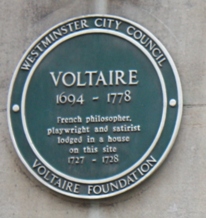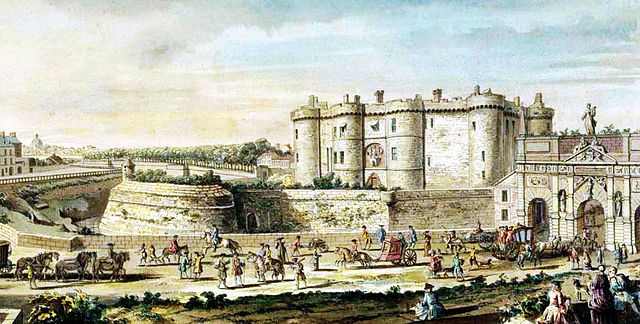Romance of London: Strange Stories, Scenes And Remarkable Person of the Great Town in 3 Volumes
John Timbs
John Timbs (1801-1875), who also wrote as Horace Welby, was an English author and aficionado of antiquities. Born in Clerkenwell, London, he was apprenticed at 16 to a druggist and printer, where he soon showed great literary promise. At 19, he began to write for Monthly Magazine, and a year later he was made secretary to the magazine’s proprietor and there began his career as a writer, editor, and antiquarian.
This particular book is available at googlebooks for free in ebook form. Or you can pay for a print version.
Voltaire in London
Voltaire lodged at the sign of the White Peruke, a fashionable French perruquier’s, in Maiden Lane, Covent Garden. In Swift’s Works (vol. xx of the duodecimo edition, p. 294), there is a letter to him, in English, by Voltaire, and dated from this house. The English seems a little too perfect. There is another following it which looks more authentic. But there is no doubt that Voltaire, while in England, made himself such a master of the language, as to be able to write in it with singular correctness for a foreigner. He was then young. He had been imprisoned in the Bastile for a libel; came over here, on his release; procured many subscriptions for the “Henriade;” published in English “An Essay on Epic Poetry,” and remained some years, during which he became acquainted with the principal men of letters—Pope, Congreve, and Young. He is said to have talked so indecently at Pope’s table (probably no more than was thought decent by the belles in France), that the good old lady, the poet’s mother was obliged to retire. Objecting, at Lord Chesterfield’s table, to the allegories of Milton, Young is said to have accosted him in the well-known couplet:—
Thou art so witty, profligate, and thin,
Thou seem’st a Milton, with his Death and Sin.
But this story has been doubted. Voltaire left England with such a mass of subscriptions for his Henriade as laid the foundation of his fortunes, and with great admiration of English talent and genius, particularly that of Newton and Locke, which, with all his insinuations against our poetry, he took warm pains to extend, and never gave up. He was fond to the last of showing he had not forgotten his English. Somebody telling him that Johnson had spoken well of his talents, he said, in English, “He is a clever fellow;” but the gentleman observing that the doctor did not think well of his religion, he added, “a superstitious dog.”
During his residence in Maiden Lane, there is a story of Voltaire’s having been beset, in one of his walks, by the people, who ridiculed him as a Frenchman. He got upon the steps of a door-way and harangued them in their own language in praise of English liberty and the nation; upon which, the story adds, they hailed him as a fine fellow, and carried him to his lodgings on their shoulders.—Leigh Hunt’s Town.
La Henriade
From Wikipedia:
La Henriade is an epic poem of 1723 written by the French Enlightenment writer and philosopher Voltaire. According to Voltaire himself, the poem concerns and was written in honour of the life of Henry IV of France, and is a celebration of his life. The ostensible subject is the siege of Paris in 1589 by Henry III in consort with Henry of Navarre, soon to be Henry IV, but its themes are the twin evils of religious fanaticism and civil discord. It also concerns the political state of France. Voltaire aimed to be the French Virgil, outdoing the master by preserving Aristotelian unity of place—a property of classical tragedy rather than epic—”by keeping the human action confined between Paris and Ivry. It was first printed (under the title La Ligue) in 1723, and reprinted dozens of times within Voltaire’s lifetime.
Voltaire in Great Britain
From Wikipedia:
In early 1726, a young French nobleman, the chevalier de Rohan-Chabot, taunted Voltaire about his change of name, and Voltaire retorted that his name would be honoured while de Rohan would dishonour his. Infuriated, de Rohan arranged for Voltaire to be beaten up by thugs a few days later. Seeking compensation, redress, or revenge, Voltaire challenged de Rohan to a duel, but the aristocratic de Rohan family arranged for Voltaire to be arrested and imprisoned in the Bastille on 17 April 1726 without a trial or an opportunity to defend himself. Fearing an indefinite prison sentence, Voltaire suggested that he be exiled to England as an alternative punishment, which the French authorities accepted. On 2 May, he was escorted from the Bastille to Calais, where he was to embark for Britain.
 In England, Voltaire lived largely in Wandsworth with acquaintances including Everard Fawkener. From December 1727 to June 1728 he lodged at Maiden Lane, Covent Garden, now commemorated by a plaque, to be nearer to his British publisher. Voltaire circulated throughout English high society, meeting Alexander Pope, John Gay, Jonathan Swift, Lady Mary Wortley Montagu, Sarah, Duchess of Marlborough, and many other members of the nobility and royalty. Voltaire’s exile in Great Britain greatly influenced his thinking. He was intrigued by Britain’s constitutional monarchy in contrast to French absolutism, and by the country’s greater support of the freedoms of speech and religion. He was influenced by the writers of the age, and developed an interest in earlier English literature, especially the works of Shakespeare, still relatively unknown in continental Europe. Despite pointing out his deviations from neoclassical standards, Voltaire saw Shakespeare as an example that French writers might emulate, since French drama, despite being more polished, lacked on-stage action. Later, however, as Shakespeare’s influence began growing in France, Voltaire tried to set a contrary example with his own plays, decrying what he considered Shakespeare’s barbarities. Voltaire may have been present at the funeral of Isaac Newton and met Newton’s niece, Catherine Conduitt. In 1727 he published two essays in English, Upon the Civil Wars of France, Extracted from Curious Manuscripts, and Upon Epic Poetry of the European Nations, from Homer Down to Milton.
In England, Voltaire lived largely in Wandsworth with acquaintances including Everard Fawkener. From December 1727 to June 1728 he lodged at Maiden Lane, Covent Garden, now commemorated by a plaque, to be nearer to his British publisher. Voltaire circulated throughout English high society, meeting Alexander Pope, John Gay, Jonathan Swift, Lady Mary Wortley Montagu, Sarah, Duchess of Marlborough, and many other members of the nobility and royalty. Voltaire’s exile in Great Britain greatly influenced his thinking. He was intrigued by Britain’s constitutional monarchy in contrast to French absolutism, and by the country’s greater support of the freedoms of speech and religion. He was influenced by the writers of the age, and developed an interest in earlier English literature, especially the works of Shakespeare, still relatively unknown in continental Europe. Despite pointing out his deviations from neoclassical standards, Voltaire saw Shakespeare as an example that French writers might emulate, since French drama, despite being more polished, lacked on-stage action. Later, however, as Shakespeare’s influence began growing in France, Voltaire tried to set a contrary example with his own plays, decrying what he considered Shakespeare’s barbarities. Voltaire may have been present at the funeral of Isaac Newton and met Newton’s niece, Catherine Conduitt. In 1727 he published two essays in English, Upon the Civil Wars of France, Extracted from Curious Manuscripts, and Upon Epic Poetry of the European Nations, from Homer Down to Milton.
After two and a half years in exile, Voltaire returned to France, and after a few months living in Dieppe, the authorities permitted him to return to Paris. At a dinner, French mathematician Charles Marie de La Condamine proposed buying up the lottery that was organized by the French government to pay off its debts, and Voltaire joined the consortium, earning perhaps a million livres. He invested the money cleverly and on this basis managed to convince the Court of Finances that he was of good conduct and so was able to take control of a capital inheritance from his father that had hitherto been tied up in trust. He was now indisputably rich.
Further success followed, in 1732, with his play Zaïre, which when published in 1733 carried a dedication to Fawkener that praised English liberty and commerce. At this time he published his views on British attitudes toward government, literature, religion and science in a collection of essays in letter form entitled Letters Concerning the English Nation (London, 1733). In 1734, they were published in French as Lettres philosophiques in Rouen. Because the publisher released the book without the approval of the royal censor and Voltaire regarded the British constitutional monarchy as more developed and more respectful of human rights (particularly religious tolerance) than its French counterpart, the French publication of Letters caused a huge scandal; the book was publicly burnt and banned, and Voltaire was forced again to flee Paris.
Romance of London Series
- Romance of London: The Lord Mayor’s Fool… and a Dessert
- Romance of London: Carlton House and the Regency
- Romance of London: The Championship at George IV’s Coronation
- Romance of London: Mrs. Cornelys at Carlisle House
- Romance of London: The Bottle Conjuror
- Romance of London: Bartholomew Fair
- Romance of London: The May Fair and the Strong Woman
- Romance of London: Nancy Dawson, the Hornpipe Dancer
- Romance of London: Milkmaids on May-Day
- Romance of London: Lord Stowell’s Love of Sight-seeing
- Romance of London: The Mermaid Hoax
- Romance of London: The Bluestocking and the Sweeps’ Holiday
- Romance of London: Comments on Hogarth’s “Industries and Idle Apprentices”
- Romance of London: The Lansdowne Family
- Romance of London: St. Margaret’s Painted Window at Westminster
- Romance of London: Montague House and the British Museum
- Romance of London: The Bursting of the South Sea Bubble
- Romance of London: The Thames Tunnel
- Romance of London: Sir William Petty and the Lansdowne Family
- Romance of London: Marlborough House and Sarah, Duchess of Marlborough
- Romance of London: The Duke of Newcastle’s Eccentricities
- Romance of London: Voltaire in London
- Romance of London: The Crossing Sweeper
- Romance of London: Nathan Mayer Rothschild’s Fear of Assassination
- Romance of London: Samuel Rogers, the Banker Poet
- Romance of London: The Eccentricities of Lord Byron
- Romance of London: A London Recluse


